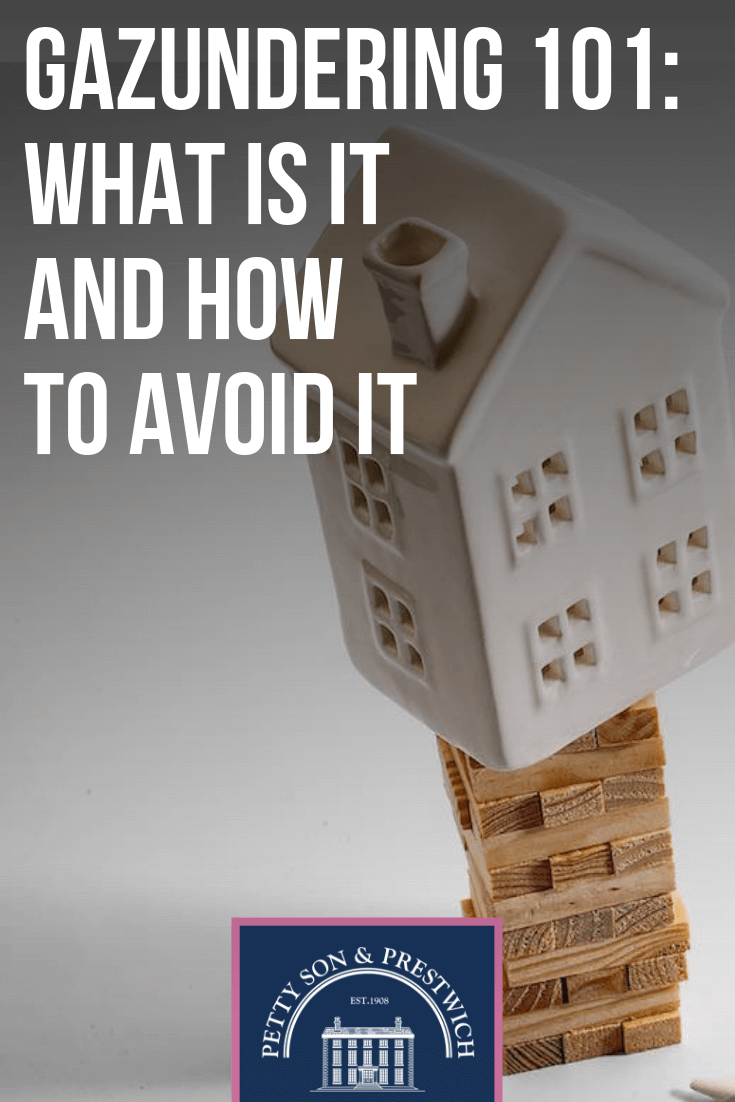Following the popularity of our post on gazumping last year, we thought it was high time we tackled its similarly named property practise - Gazundering.
In this post, we’ll explore common question such as, What is gazundering? Is it legal to gazunder? and How can I avoid gazundering? We’ll also look at some of the reasons behind why gazundering happens and what to do should you find yourself on the wrong end of the practise.
So, without further ado, let’s find out exactly what gazundering means before we dig deeper into why it occurs and what you can do to prevent it happening to you.
What is gazundering?
Gazundering, put simply, occurs when a buyer lowers their original offer just before contracts are about to be exchanged.
So, where gazumping affects the buyer, gazundering affects the seller.
Is it legal to gazunder?

In short, yes, gazundering is completely legal in both England and Wales. Until contracts are exchanged, there’s nothing legally binding about an offer.
Is gazundering immoral?
This is a tough one to answer, as there are many shades of grey in what can often feel like an entirely black and white issue.
If the buyer is using gazundering as a tactic to save money, it’s obviously poor form and could easily be classed as an immoral practise. Sometimes, a buyer may see the seller is in a weak position and look to take advantage of the fact. It does, unfortunately, happen.
However, gazundering is a blanket term used whenever a buyer lowers their offer at the last minute and it doesn’t, therefore, always mean the buyer is trying to ‘play’ the seller. There are, in fact, a number of genuine reasons why a buyer may decide to offer less than they originally agreed to. Naturally, this doesn’t change the situation much for the seller, who is still left in a sticky situation, but to tar every buyer with the same brush is unfair, too.
Below are some sincere reasons why buyers may gazunder sellers.
Common reasons for gazundering
- Survey results - Receiving word from a surveyor that a property has defects which could potentially cost the buyer many thousands of pounds would warrant an adjustment in what they are willing to pay.
- Chain reaction - Purchases are often made as part of a property chain, which means that your buyer may also be a seller, too. This makes them as susceptible to gazundering as you are and if it happens to them they may well be left unable to pay the amount agreed in their original offer.
- Miscalculation - Annoying as it may be, miscalculations happen. Buyers may get excited and overestimate what they can actually afford early on in the buying process and offer more than should. As time passes, anxieties grow and further calculations are made, which could lead to them lowering their initial offer.
- Change of heart - With the threat of gazumping looming over buyers, many will continue to search the property market even after they’ve had an offer agreed. This could lead them to find another home they prefer or one they deem to be better value for money, prompting them to reduce what they offer you as a result.
- Slow solicitors and/or agents - Speed of sale can negatively affect both parties, so it’s essential for you to have good people on your side. Should there be delays in the sale going through, there’s a chance your buyers’ mortgage offer may expire, which means they may have to reapply, and there’s no guarantee they’ll get the same deal now that they had when they made their original offer.
Should sellers accept lower offers?

Much will depend on individual circumstances and the health of the property market as a whole when it comes to deciding whether or not you should accept a lower offer from your buyer.
In a buyer’s market, which is when gazundering is more commonly seen as an unfair practise, you may well feel as though you don’t have much say in the matter. Your property may have been on the market for some time with little interest, or you may simply be desperate to sell, and the likelihood of someone coming along and offering more money could be slim.
In a more even market, sellers can often simply refuse and begin again. Annoying as this can be, it’s often the buyer who comes off worse in this scenario, as they will have laid out a substantial amount in fees by this stage, not to mention wasted their own time as well as yours.
Ideally, you’d want to be able to act on principle, but in some situations this just isn’t feasible. So, whether or not sellers accept an offer from a gazunderer is a matter of personal choice dictated by both individual circumstances and market conditions.
Can you avoid being gazundered in the first place?

Unfortunately there’s no way of completely guarding against gazundering, but you can do quite a bit to lessen the chances of it occurring. Here are a few tips:
Value your home realistically
Probably the easiest way to avoid being gazundered is to set your sale price realistically from the get-go. Offering your property for a fair price from the start will work to your advantage in several ways.
Not only will your property attract a greater number of potential purchasers, which could afford you the luxury of being able to choose which one you decide to go with, you’ll also leave buyers with very little leeway when it comes to bargaining at a later date.
Remember that buying a property is often as much an emotional purchase as it is a practical one. Buyers can fall in love with a home on first viewing and feel compelled to make an offer to avoid missing out on a chance to own their ‘dream home’.
Selling up, however, takes time, and this can be enough for buyers to change their mind and offer less than they did initially, especially if they see there’s little value in the home after all. Setting a fair price from the start will help lessen the chances of this happening.
Be upfront about known problems
If you know there’s a problem with the property, say so at the start. Too often, sellers will try to hide an issue in the vain hope of it slipping by the buyer. This is not the way to do things and is, frankly, dishonest.
The likelihood is that the buyer’s surveyor will unearth your deceit and leave you in an awkward spot anyway, so be upfront and honest. Doing so will not only save you the ignominy of being found out, it’ll also greatly reduce the chances of your buyer trying to lowball you at the eleventh hour.
Offer to pay for any issues found by a surveyor
If you’ve been honest about all the known problems but your buyer’s surveyor unearths something you’re unaware of, you could consider the option of paying for the work to be carried out yourself rather than accepting a lower offer.
This can be attractive to both parties. Your buyer will not have to experience the upheaval of having contractors in their new home right at the start, while you’ll probably be able to make good on the issue in a more cost-effective manner, which will save you money.
Work only with reputable professionals
This is a big one, as delays can often be the root cause of gazundering. Trying to save money on estate agents and solicitors can come back to bite you later on as the delays incurred by doing things ‘on the cheap’ may cost you your sale altogether. Of course, we have a vested interest in suggesting this, but that doesn’t make it any less true.
Agents who have a designated Sales Progressor will help move your transaction along swiftly and smoothly. Similarly, good conveyancing solicitors will get things squared away sharply, too.
One point to bear in mind here is the incentive of agents offering upfront, low fees. They may charge you less, but they’ll have your money in their hands whether your sale goes through or not, leaving them with zero incentive to get the job done.
Consider the chain
Coming full circle to point one, we have to mention the option of considering the strengths and weaknesses of your buyer’s chain. Naturally, we are in no way suggesting that this should be your primary defence against gazundering, as a decent offer is a decent offer, regardless of what their chain is like, but, if you’ve set your sales price realistically, your chances of being able to pick and choose rise significantly.
So, if you find yourself in a position where everything else is equal apart from the buyer’s chain, opting for one who is chain-free will invariably serve you well.
Gazundering 101...done!
That’s it, we’re at the end of our gazundering guide. We hope you found it helpful.
If you are looking to enter the property market any time soon, be sure to choose a fully accredited agent and reputable solicitor to fight your corner. If you would like to discuss your options further, please do not hesitate to get in touch with our team for advice.
